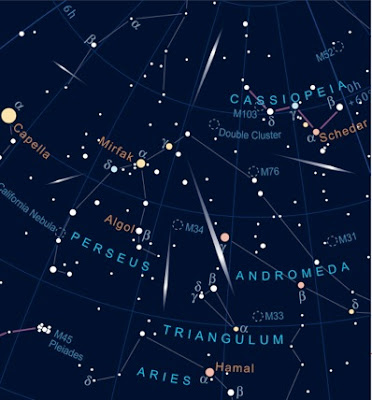Astronomy

- Watch Geminid Meteor Shower On 13th And 14th December
If you are a sky gazer then you won't like to miss a chance to watch the beautiful Geminid meteor shower coming this week and if astronomers are to be believed its going to the "best meteor shower of the year". The name Geminids comes from the name...
- Watch Perseids Meteor Shower Along With Thin Crescent Moon This Thursday
If you happen to be a star gazer then be prepared to see the yearly meteor shower of Perseids and you can also see a young Moon along with Venus, Mars and Saturn in the west-southwestern sky just after sunset. You can enjoy the best Perseids meteor shower...
- Lyrid Meteor - Another Meteor Shower This April
I love to watch meteor shower , and my previous post describes about Leonid meteor shower . Coming this week on 22nd April Lyrid meteor peaks . Lyrid meteor is named after its constellation from where it originates and it peaks on 22nd April a day after...
- Leonid Meteor Shower
For those who love to watch meteor shower , there is going to be Leonid meteor shower during the night 16 th and 17 th November , 2009. These meteor emanate from the constellation Leo hence they are named as Lenoid. Astronomers believe that we can observe...
- Geminids
Geminids The Geminids are a meteor shower caused by the object 3200 Phaethon, which is thought to be a Palladian asteroid with a "rock comet"...
Astronomy
Meteor shower in the sky

The meteor season is into full swing over the next few days as the Perseid meteor shower reaches its peak over the nights of 11-12 and 12-13 August. If we can blot out some of the Moon?s light behind a tree or nearby building, we can see at least one meteor per minute.
Perseids , gets the name from constellation Perseus. The warm summer nights in UK will make the Perseids more visible.
Some Perseids can be as bright as the brightest stars, such as Vega or as Jupiter or even as Venus. Some leave behind lingering orange trails or on odd occasions appear as fireballs. You either record these events or sit back and just enjoy.
- Watch Geminid Meteor Shower On 13th And 14th December
If you are a sky gazer then you won't like to miss a chance to watch the beautiful Geminid meteor shower coming this week and if astronomers are to be believed its going to the "best meteor shower of the year". The name Geminids comes from the name...
- Watch Perseids Meteor Shower Along With Thin Crescent Moon This Thursday
If you happen to be a star gazer then be prepared to see the yearly meteor shower of Perseids and you can also see a young Moon along with Venus, Mars and Saturn in the west-southwestern sky just after sunset. You can enjoy the best Perseids meteor shower...
- Lyrid Meteor - Another Meteor Shower This April
I love to watch meteor shower , and my previous post describes about Leonid meteor shower . Coming this week on 22nd April Lyrid meteor peaks . Lyrid meteor is named after its constellation from where it originates and it peaks on 22nd April a day after...
- Leonid Meteor Shower
For those who love to watch meteor shower , there is going to be Leonid meteor shower during the night 16 th and 17 th November , 2009. These meteor emanate from the constellation Leo hence they are named as Lenoid. Astronomers believe that we can observe...
- Geminids
Geminids The Geminids are a meteor shower caused by the object 3200 Phaethon, which is thought to be a Palladian asteroid with a "rock comet"...
